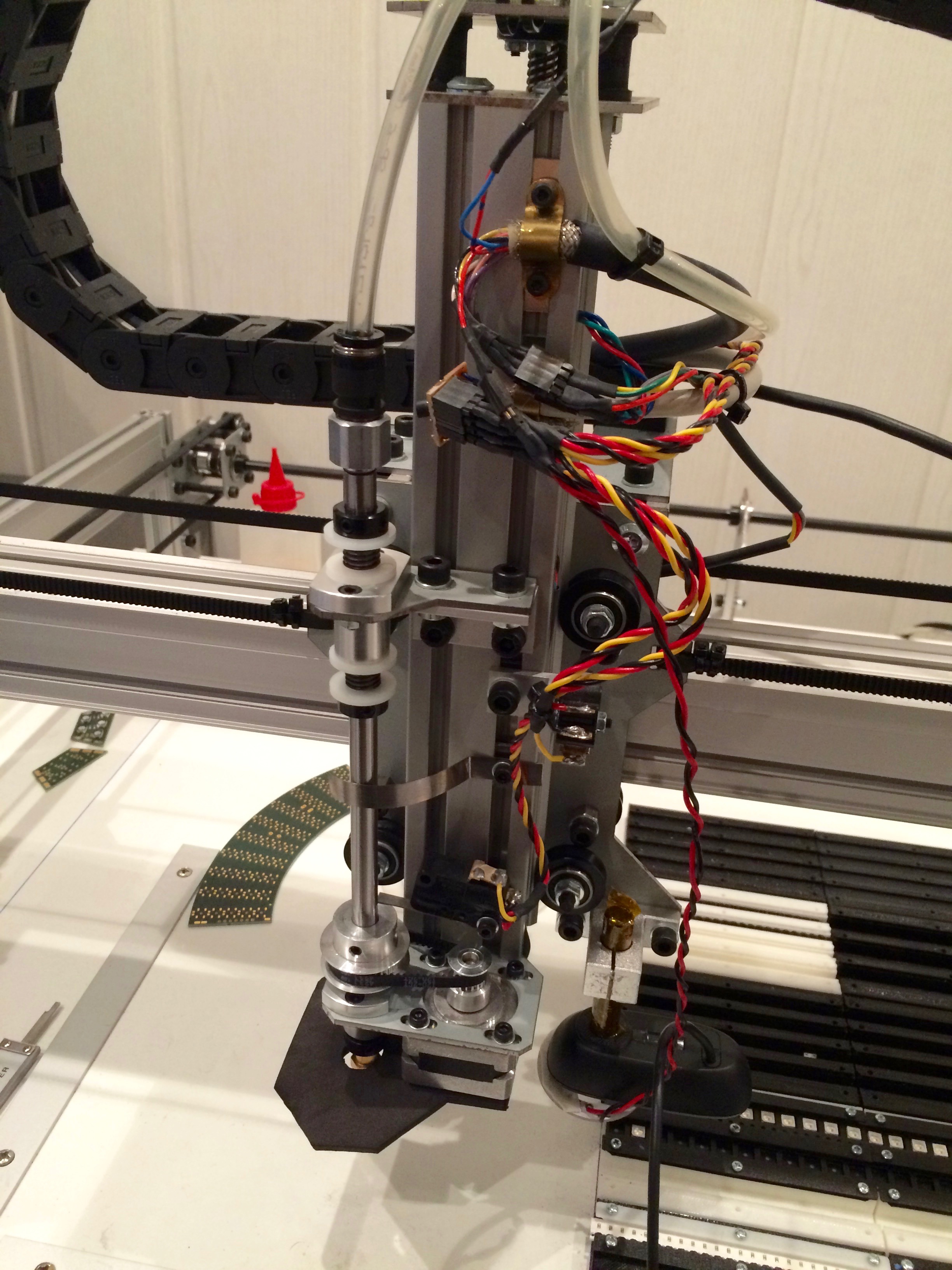Page 1 of 1
Short Tip for Update Kit Assembly
Posted: Thu Sep 29, 2016 8:55 am
by mawa
Yesterday I upgraded my Liteplacer with Yuhas Update Kit.

Great work by the way!
It does not take much time, but I ran into a minor problem in step 5 changing the two bearings.
I first just replaced the bearings and adjusted the vertical height of the PnP head middle plate. But the tube moved very sluggish. The clearance of the 3mm holes is insufficient the get the bearing aligned right.
There seems to be a minor alignment and angle difference between the old an new bearings preventing the tube to run free of pressure.
Solution is to first fix the two bearing with the 3mm screws, nuts and washers and then loosen the the two screws of the PnP head middle plate and adjust the plates position to get free movement of the tube and fix the position by gradually tightening the two plate screws.

- The new PnP gantry
- IMG_1629.jpg (1.12 MiB) Viewed 7601 times
Re: Short Tip for Update Kit Assembly
Posted: Fri Sep 30, 2016 8:39 pm
by ameli
Thanks for the tip. I received my update kit as well.
I haven't assembled the nozzle holders yet, but I am curious how much force is required to insert and remove the nozzles to the vacuum head? Just playing around with it manually so that I can measure wobble, and it seemed that it was taking a lot of force to push the nozzle into the head. Do do need to lubricate the o-rings?
Re: Short Tip for Update Kit Assembly
Posted: Sat Oct 01, 2016 5:49 am
by JuKu
It doesn't need as much force in the machine as it feels manually; it is a tight fit, and needs to go in straight.
I don't use any lubricant, at least yet. But a suitable lubricant would not hurt and likely reduces wear on the seals. We need some that doesn't dry up in the open air, and doesn't fall down to the tip nor can be sucked into the valve. Anyone know what to buy?
Re: Short Tip for Update Kit Assembly
Posted: Sat Oct 01, 2016 5:28 pm
by mrandt
JuKu wrote:We need some that doesn't dry up in the open air, and doesn't fall down to the tip nor can be sucked into the valve. Anyone know what to buy?
I suggest a silicon based lubrication spray.
I have both used Wekem WS 74-400 and E-Coll Silicon Spray for similar purposes; most available products should meet your requirements.
Re: Short Tip for Update Kit Assembly
Posted: Mon Oct 03, 2016 7:59 pm
by mawa
I think lubrication will be necessary. I left a nozzle on the adapter for a couple of days and today I needed quite a bit of force to pull the nozzle off.
Afterwards the nozzle went on and off with much less force.
Therefore it may be advisable to explicitly unload the nozzle before shutting down the machine.
For the lubricant: it should be assured that the substance does not degrade the sealing ring material.
Re: Short Tip for Update Kit Assembly
Posted: Sun Oct 23, 2016 12:40 am
by Timbosaurus
I found the same when fitting the tube. It was quite sticky (up/down and turning) until I did up the fasteners in a particular order. For me, the order was:
- slightly loosen the bearing fasteners and the four fasteners that hold the top bearing plate, just enough to allow movement.
- make sure the tube spins freely
- moderately tighten the bearing fasteners first - check movement
- moderately tighten the fasteners that hold the upper bearing plate bracket onto the vertical slide - check movement
- moderately tighten the fasteners that hold the upper bearing plate to the right angle bracket - check movement
- fully tighten all again (in the same order, not that that would make much difference) - check movement
now it spins/slide beautifully, far better than the old tube ever did!
I also wonder how long the seals will last on the adapter, as i think I've seen a few tiny slivers of rubber (or whatever it is) come off , and whether lube would help. There is a slight variance in force required from tip to tip, and I do assume it will loosen up through use though.
Juha, it might not be a bad idea to offer the adapters/tips or even the seals (if you can find them) as spares in your shop... as I would certainly love to have some on hand in case something goes wrong, which inevitably happens late at night while building PCB's that are needed the next day.
 Great work by the way!
Great work by the way!